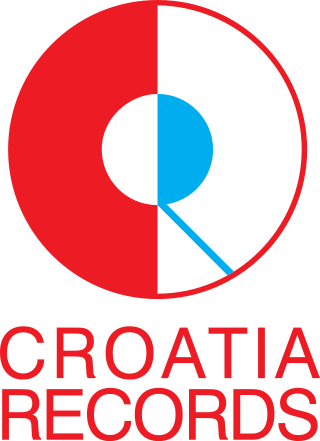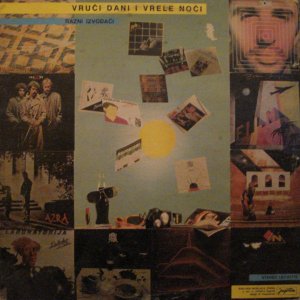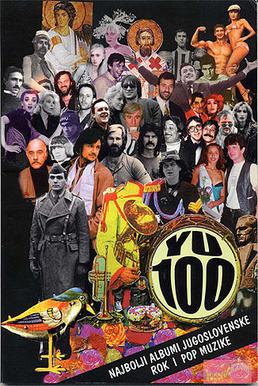
Prljavo kazalište is a rock band from Zagreb, Croatia. Since its formation in 1977, the group changed several music styles and line ups but remained one of the top acts of both the Croatian and Yugoslav rock scenes.

Croatia Records is a record label in Croatia owned by AUTOR d.o.o., based in Zagreb.

Parni Valjak is a Croatian and Yugoslav rock band formed in Zagreb in 1975. They were one of the most popular acts of the Yugoslav rock scene, and have maintained large popularity in all former Yugoslav republics after the breakup of the country.

Jugoton was the largest record label and chain record store in the former Yugoslavia based in Zagreb, SR Croatia.
New wave in Yugoslavia was the new wave music scene of the Socialist Federal Republic of Yugoslavia. As its counterparts, the British and the American new wave, from which the main influences came, the Yugoslav scene was also closely related to punk rock, ska, reggae, 2 tone, power pop and mod revival. Some of its acts are also counted as belonging to the Yugoslav punk scene which already existed prior to new wave. Such artists were labeled as both punk rock and new wave.

Paket aranžman is a new wave compilation album released in 1981 by Jugoton. Featuring eminent Belgrade acts Šarlo Akrobata, Idoli and Električni Orgazam, it is considered to be one of the most important and influential records ever made in SFR Yugoslavia. In addition to critical praise, it reached a cult status among the audiences and continues to be popular across the countries that emerged after the breakup of Yugoslavia.
Punk rock in Yugoslavia was the punk subculture of the former Socialist Federal Republic of Yugoslavia. The most developed scenes across the federation existed in the Socialist Republic of Slovenia, the Adriatic coast of the Socialist Republic of Croatia, the Socialist Autonomous Province of Vojvodina and Belgrade, the capital of both Yugoslavia and the Socialist Republic of Serbia. Some notable acts included: Pankrti, Paraf, Pekinška patka, KUD Idijoti, Niet, Patareni and KBO!.
Popular music in Yugoslavia includes the pop and rock music of the former SFR Yugoslavia, including all their genres and subgenres. The scene included the constituent republics: SR Slovenia, SR Croatia, SR Bosnia and Herzegovina, SR Montenegro, SR Macedonia and SR Serbia and its subunits: SAP Vojvodina and SAP Kosovo. The pop and rock scene was a part of the general Music of Yugoslavia, which also included folk, classical music, jazz etc. Within Yugoslavia and internationally, the phrases ex-YU or ex-Yugoslav Pop and Rock both formally and informally generally to the SFRY period, though in some cases also to its successor the FR Yugoslavia including Serbia and Montenegro which existed until 2006.

Električni Orgazam is a Serbian rock band from Belgrade. Originally starting as a combination of new wave, punk rock and post-punk, the band later slowly changed their style, becoming a mainstream rock act. They were one of the most notable acts of the former Yugoslav rock scene.

Vrući dani i vrele noći is a compilation album released by Jugoton in 1982 in the former SFR Yugoslavia.

Svi marš na ples! is a compilation album released by Jugoton in 1981 in SFR Yugoslavia.

Sretno dijete is a Croatian documentary film directed by Igor Mirković, and produced by Rajko Grlić, an Ohio University professor of film, in 2003. The film is a nostalgic autobiographical overview of the author's adolescence in SR Croatia in the former Socialist Federal Republic of Yugoslavia during the late 1970s and early 1980s which corresponded with the emergence of the Yugoslav punk rock and new wave scenes, both which the author affiliated to, thus turning this film into a rockumentary. The film features interviews and rare footage of some of the top former Yugoslav rock acts ever such as: Azra, Film and Haustor from the author's hometown Zagreb, Croatia where most of the story takes place; then members of Električni orgazam and Idoli whom the author visits in Belgrade, Serbia; as well as Pankrti and Buldožer from Ljubljana, Slovenia. Beside materials filmed around former Yugoslavia, the film also contains interviews with important former Yugoslav artists who currently live abroad. For example, Darko Rundek is interviewed in Paris, France, Mirko Ilić in New York City in the United States, and there are also scenes shot on locations in the Netherlands, Germany, Hungary and other countries. The film is named after a song by Prljavo kazalište from their first self-titled album.
"Retko te viđam sa devojkama" is the second song which appeared on the first single by Serbian new wave band Idoli.

Dorian Gray was a 1980s Yugoslav music group which achieved great prominence in the former Yugoslav rock scene for its artistic and extravagant style and stage performances. It was led by Massimo Savić, who later started a successful solo career. It should not be confused with the short-lived 1970s German band of the same name.

Polish-Serbian relations are foreign relations between Poland and Serbia. Diplomatic relations have been maintained since Poland and the Kingdom of Serbs, Croats and Slovenes established them in 1919. Poland is a European Union member state and Serbia is a European Union candidate.
Kulušić was a concert club in Zagreb, SR Croatia, SFR Yugoslavia), which hosted many famous international acts and all the important acts from the region. It is particularly associated with the Yugoslav new wave acts of the late 1970s and early 1980s. Many Live albums which today are part of the ex-Yugoslav music history were recorded in Kulušić. Film, Bijelo dugme and Azra recorded their live albums in Kulušić in 1981, followed by Buldožer, Haustor and Leb i sol in 1982, and Ekatarina Velika and Električni orgazam in 1986. Davor Gobac of Psihomodo Pop introduced his infamous stage undressing act in a 1983 gig in Kulušić. Bajaga i Instruktori, one of the foremost Yugoslav pop-rock bands, held their very first concert in Kulušić, on April 12, 1984.

Hi-Fi Centar was a record label based in Belgrade, Serbia.

YU 100: najbolji albumi jugoslovenske rok i pop muzike is a book by Duško Antonić and Danilo Štrbac, published in 1998. It features a list of top 100 former Yugoslav popular music albums, formed according to the poll of 70 Serbian music critics, journalists, artists and others.
Rockovnik is a forty-episode documentary aired on Radio Television of Serbia in 2011, written by Sandra Rančić and Dušan Vesić and directed by Vesić. The series focuses on the history of former Yugoslav rock scene from its beginnings in the late 1950s until the year 2000. The name of the show is a bilingual pun based on the words "rock" and "rokovnik".
Męskie Granie is a concert tour, initiated by Żywiec Brewery. It is organized each year in the summer in major Polish cities, with the addition of the town Żywiec. The first edition was held in 2010.













